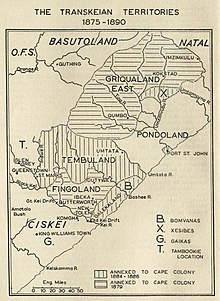The Ngqika people are a Xhosa monarchy who lived west of the Great Kei River[1] in what is today the Eastern Cape of South Africa. They were first ruled by Rarabe kaPhalo who died with his son Mlawu, who was destined for chieftaincy. The clan would be named after Ngqika ka Mlawu, the son of the then late Mlawu.[2] It would be years before the child would rule his people who fought in the Xhosa Wars, which were sparked by the encroachment of European settlers on Xhosa lands.[3]


The Dutch East India Company (VOC) that was responsible for trading and colonising of South African land in what is described as “founding” several urban areas like towns and cities in already populated areas of the west of South Africa. The organisation continually changed the boundaries in the Cape Colony due to European invasion and migration, establishing the Great Fish River as the eastern frontier in 1778.[3]
In colonial times, the Ngqika lands were known as British Kaffraria. Later the Apartheid government of South Africa gave them a form of independence as the former "Ciskei" homeland.
The clan were referred to as “Gaika” people by the Europeans.
- ^ 2017. Ngqika ka Mlawu, 3rd Paramount Chief of the amaRarabe. Geni. Accessed 13 March.
- ^ 2017. Maqoma's final resistance. News24. Accessed 13 March.
- ^ a b "2011. Conquest of the Eastern Cape 1779-1878. SA History. Accessed 13 March". Archived from the original on 2017-09-20. Retrieved 2018-04-02.